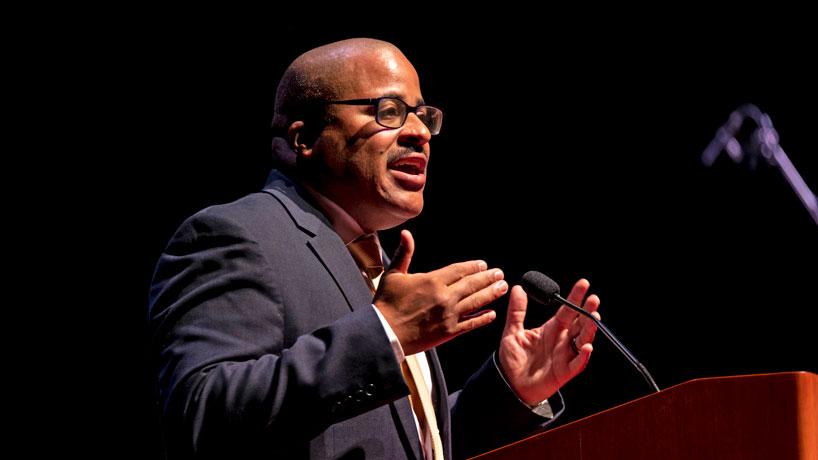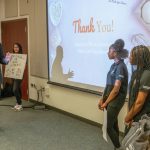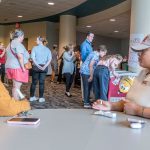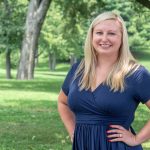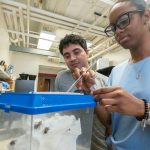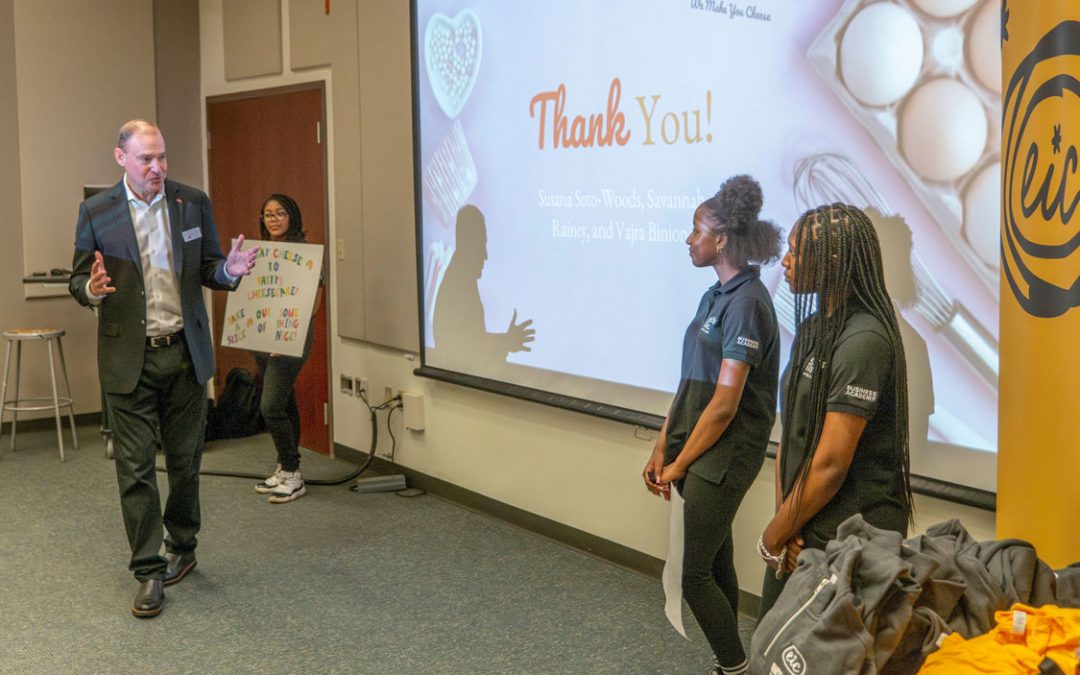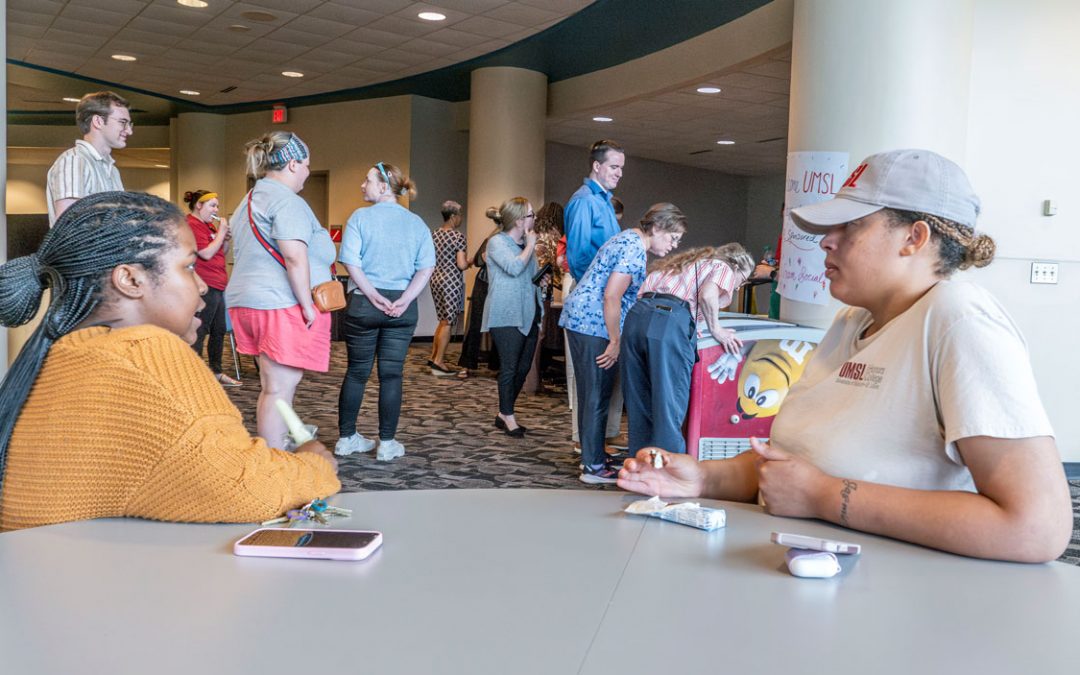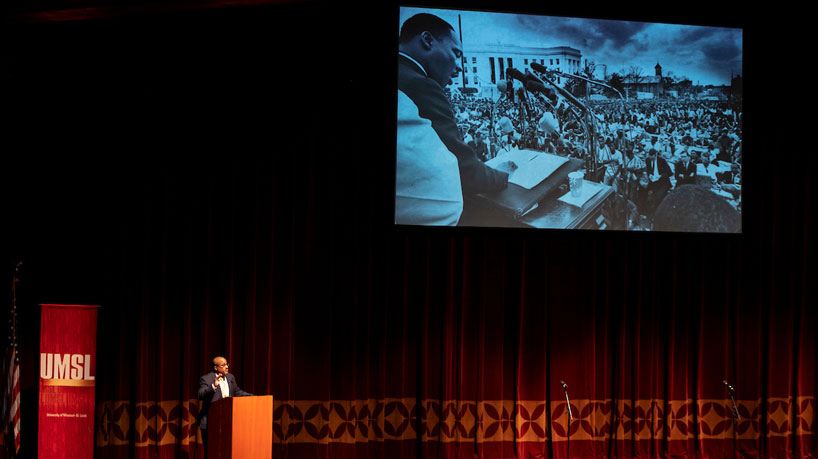
Cliff Albright of Black Votes Matter delivered the keynote address at the 2023 Dr. Martin Luther King, Jr. Holiday Observance at UMSL. (Photo by August Jennewein)
In “Where Do We Go from Here: Chaos or Community?”, his last book before his assassination in 1968, Dr. Martin Luther King, Jr. famously wrote that “Power without love is reckless and abusive, and love without power is sentimental and anemic. Power at its best is love implementing the demands of justice, and justice at its best is power correcting everything that stands against love.”
Cliff Albright drew inspiration from those words as he encouraged the audience to join the movement to build Black voting power in his keynote speech, “The Power of the Vote: Ending Voter Suppression Now,” during the annual MLK Holiday Observance inside the Blanche M. Touhill Performing Arts Center at the University of Missouri–St. Louis on Monday.
A 2020 Soros Equality Fellow, Albright is the executive director and co-founder of Black Voters Matter, which seeks to increase power in marginalized, predominantly Black communities by energizing voters and exposing voter suppression. The organization conducts voter outreach across the United States and gained national attention in 2017 when it helped mobilize Black voters during the U.S. Senate race between Doug Jones and Roy Moore.
In Albright’s speech, he encouraged the audience to consider what can be learned from Dr. King’s words and teachings in the battle against what he famously referred to as the “three evils”: racism, poverty and war. As the topic honed in on voting rights, Albright began by reminding the audience that Black Americans received the right to vote over 150 years ago with the passing of the 15th Amendment in 1870, but that those rights were stripped away over time with the onset of Jim Crow laws.
“For a while, as some of you may know, we had elected officials all up and down the ballot all across states,” he said. “We had governors, we had senators, we had congresspeople, we had state legislatures, right? We had all of that, but it was slowly taken away with the onset of Jim Crow. If that kind of power was taken away, we’re talking about insurrection. We just commemorated the two-year anniversary of an insurrection. That wasn’t the first insurrection. We’ve had elections overturned in Black communities before in this country.
“And so we had the right to vote in 1870, but along comes Jim Crow and we have the grandfather clause, we have the jellybean test, we have the literacy test, we have all of these things that were done in order to limit that right to vote. … What we’re seeing today – a range of restrictions from photo ID to making it harder to vote in person to doggone it, making it illegal to give out food and water at polling places – none of those have to have a “Whites Only” or “Blacks Only” sign above it in order to be Jim Crow 2.0. And so those are the things that we continue to fight against today.”
Albright’s speech, “The Power of the Vote: Ending Voter Suppression Now,” highlighted the importance of energizing and empowering Black voters. (Photo by August Jennewein)
Albright went on to share five lessons for movement-building, starting with a recognition of both love and power, as inspired by Dr. King, which he said undergirds the work at Black Voters Matter.
“We have got to have both of those things; we have got to be willing to talk about and seek out power,” he said. “We’ve been taught that power is a dirty word because for so long power has been used recklessly and abusively against us – the kind of power that has you shoot a young man in his back. The kind of reckless and abusive power that has you put your knee on somebody’s neck for nine minutes. The kind of power that has you enslave a group of people. But we’ve got to recognize that we can have power that is merged with love that lets us be the best of what we’re supposed to be, that lets us have the things that we deserve without us having to hold somebody else down in order to get it. That’s the kind of power that we need. We need and deserve the power to control our own destinies – to control our housing, our schools, our communities, all of that.”
Throughout the lecture, Albright continued to draw on King’s words to share lessons for the movement, including the importance of coalition-building across different demographics, the pitfalls of the white moderate and “both-sides-ism,” the ongoing need for nonviolent civil disobedience and, finally, the importance of understanding timing in the movement. Yet he said the most important lesson to take away is not necessarily about the movement itself, but a question each person should ask themselves.
“What will my role be?” he said. “Will I be a drum major for justice the way Dr. King talked about? Now, not everybody has to have the same role. Not everybody needs to be a great speaker. Sometimes your role is that you might be the one that cooks the food at the community meeting, you might be the one that does the artwork for the graphics, you might be the one that sends the phone call or the text messages. But what we say at Black Votes Matter, and what I believe in my heart, is everybody has a role to play.”
“The decisions we make, the answer to that question, ‘What will my role be?’ can ultimately change this country,” he continued in his final remarks. “That’s the power that you have. But that can only happen if we believe in our power.”
UMSL music student Arissa Ford-Jones opened the celebration, which was held in-person for the first time since the onset of the COVID-19 pandemic, with a powerful performance of “I’m Here.” The Sheldon’s All-Star Chorus, under the direction of Maria A. Ellis, performed “Lift Every Voice and Sing,” “Lovely Day” and “We Shall Overcome.”
UMSL alumna Tierra K. Parks Brown, a writer, speaker and educator, served as the master of ceremonies for the event, which also featured remarks from Vice Chancellor for Diversity, Equity and Inclusion Tanisha Stevens and Chancellor Kristin Sobolik as well as a recognition of UMSL’s three Martin Luther King Jr. Scholarship recipients, Beauty Cooper, Jeff Luffman and Kheriss Turner.

